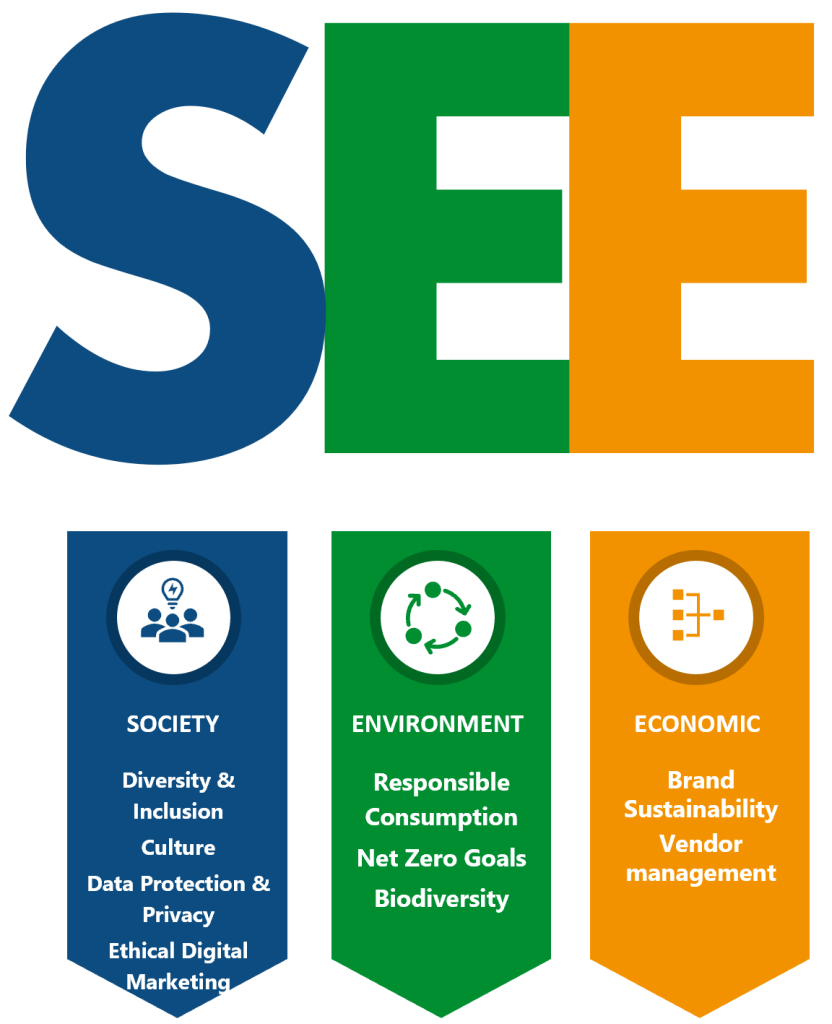After careful research, Flock were delighted to recently release our Marketing Sustainability Whitepaper, “The Sustainable Marketer”. The paper includes three important frameworks to help marketing organizations build a Marketing Sustainability Strategy and provides examples, useful resources and case studies from our partners at WARC.
It’s a must-read for any modern marketer! Download “The Sustainable Marketer” below:
As part of the report, we developed a framework to action sustainability in marketing. The framework is based on three simple principles: SEE, ACT, MEASURE. This whitepaper focuses on the framework Society, Environment and Economy (S.E.E) and highlights key topics directly affected through marketing within the three areas of sustainability. The second “E” of SEE – Economy, will be the focal point for this article. You can find details on Society and Environment in our downloadable whitepaper (see above link).

ECONOMICAL IMPACT
Marketing can have a sustainable impact economically by establishing a genuine brand purpose that resonates with the consumer. Along with this, clearly communicating values with stakeholders and ensuring short-term targets compliment and fulfil the brand’s long-term goals, carry equal weighting in this part of the framework. While implementing sustainable business practices requires investment, continued research shows the long-term financial gain significantly outweighs any short-term loss. Unilever, as an example, has invested heavily over the past decade in their sustainable loving brands such as Lipton. As the largest producer of tea, Unilever invested heavily in education, training and certifying their tea suppliers in partnership with the Rainforest Alliance, to drive sustainable farming practices.
While Unilever may have taken short term financial losses to implement sustainable practice across their global supply chain, over the past several years their sustainable living brands have outperformed Unilever’s average rate of growth. As of 2019, their 28 Sustainable Living Brands grew 69% faster than those without purpose and delivered 75% of Unilever’s turnover in 2019.

In addition, as a marketer, you’ll want to build sustainable brands with a long-term future, not just “milk them” for short-term gain. True marketing sustainability means considering the balance of long-term brand building and short-term gain. The paper “The Long And The Short Of It” proves the benefits of using a sustainable approach when building brands.
Key questions to ask to help you to A.C.T.
- Does your company have a genuine brand purpose with clean values, not just rhetoric?
- Can your marketing activities meet both short and long-term needs? For example, can short-term sales driving activity be modified to benefit building the brand in the longer term?
- Are your actions in procurement and other areas jeopardising the welfare of suppliers and vendors?
Access “The Sustainable Marketer” for more information, key questions, and resources on how marketers can improve their economical impact here.
Learn more about what Flock are doing to become more sustainable click here.
Take the Flock Marketing Sustainability Benchmark Survey click here.
Or, to chat to us about your own thoughts on Marketing Sustainability, please feel free to contact us using the form below. We’d love to hear from you!


